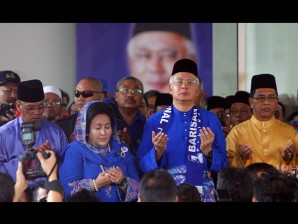Malaysian populist windfall fuels debt fears

Malaysian Prime Minister Najib Razak, center right, and his wife Rosmah Mansor, center left, offer prayers before leaving for an election nomination center in Pekan, Pahang state, Malaysia, Saturday, April 20, 2013. Malaysians will go to the polls on May 5. AP/Lai Seng Sin
KUALA LUMPUR — It has never been more lucrative to be a voter in Malaysia, where political rivals are showering the public with cash in a desperate electoral battle, stoking concerns over rising national debt.
With May 5 elections expected to be Malaysia’s closest ever, the long-ruling coalition has given billions of dollars in new cash, pay rises and other handouts to civil servants, the poor, elderly, farmers and students.
The opposition, which holds four of 13 states, has likewise made a range of state-level payouts, and promises still more perks if it wins federal power for the first time in Malaysia’s 56 years of independence.
The bidding war began shortly after the opposition stung the Barisan Nasional (National Front) coalition in 2008 elections, but has spiralled of late.
“It’s been a windfall for Malaysians these past five years,” said Francis Loh, president of Malaysian democratic rights group Aliran.
Article continues after this advertisementThe bonanza has seemed farcical at times.
Article continues after this advertisementBarisan recently denounced opposition campaign pledges as a blueprint for insolvency.
But Prime Minister Najib Razak promptly upped the ante with billions in new promises of his own — sparking opposition outrage that he copied their ideas.
The unprecedented giveaways attest to the high stakes of an election in which a ruling elite is desperate to retain power and its rich perks, while the opposition fights to make the most of its best shot yet at governing.
But warnings are emerging that Malaysia — which already has Southeast Asia’s highest debt-to-GDP ratio, after Singapore — is at best endangering a goal to become a “developed nation” by 2020 and at worst courting disaster.
“Today’s politicians are bent on planting the seeds of an economic crisis for our children to inherit,” said Wan Saiful Wan Jan, who runs the IDEAS think-tank.
If Malaysia meets financial catastrophe in the future, “economic historians may well trace back the root cause to this general election,” he added.
Few analysts see an immediate threat of disaster, noting the situation can be managed if some hard post-election political choices are made.
But some say much-needed development spending could shrink further if increasingly hard-fought politics continue to trump economic planning in a country where populist subsidies have come to be expected by many voters.
Such spending fell from 28 percent of the 2010 budget to 20 percent this year.
“There is a concern if populist spending were to get in the way of infrastructure spending which will have longer-term repercussions on the economy,” said Gundy Cahyadi, a Singapore-based economist with OCBC bank.
Under Barisan, resource-rich Malaysia developed into a regional economic success, enjoying decades of growth, foreign investment inflows, and rising living standards.
But lower-cost rivals China, Indonesia and others have forced a re-focusing on high-tech manufacturing and services even as critics say Malaysia’s education system is failing to prepare graduates for a move up the value chain.
Economic growth was a solid 5.6 percent last year, but much of that is credited to election-minded deficit spending. Debt has doubled since 2007 to 53.7 percent of GDP.
In emailed comments to AFP, Najib said “our debt will never exceed 55 percent of GDP,” but critics note “hidden” public debt such as state-guaranteed loans may have doubled since he took power in 2009.
Malaysia politics analyst Bridget Welsh estimates that since taking office Najib has given out $19 billion in public funds — $1,400 per voter — for “political spending” that benefits Barisan.
That is “the most ever in the lead-up to Malaysian polls” said Welsh, of Singapore Management University.
In campaign stops, Najib regularly references the largesse, telling voters to pay back it at the ballot box.
“If he wins, it will become a crutch politicians rely on, an extension of money politics,” she said.
Moves by the opposition Pakatan Rakyat (People’s Pact) alliance include a water subsidy in a key state won in 2008 that has drained 20 percent from the state’s operating budget. Cash payments in Pakatan states also have grown.
If it wins federal power, it promises to make university education free, scrap various taxes and fees, and raise subsidies, moves it says will cost $15 billion per year.
Barisan counters that they will cost $65 billion, or 80 percent of today’s federal budget.